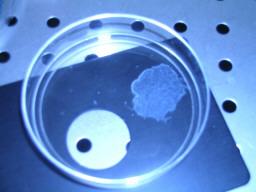A decision by United States President Barack Obama to lift strict limits on human embryonic stem cell research was probably motivated by ''economic interests'', a Vatican official said Tuesday.
''This is a Pyrrhic victory because scientists have been telling us that embryonic stem cells are going nowhere at the moment, while adult stem cells have already resulted in cures for around 2,000 illnesses,'' said Pontifical Academy of Life President Msgr Rino Fisichella.
''If science and scientists say that at the moment this is not the direction to travel, why insist on following it? Maybe there are other interests''?
Msgr Fisichella said these interests were ''probably of some pharmaceutical companies or other economic interests''.
US shares in stem cell research companies rose sharply after Obama announced Monday that federal funds would be freed up, reversing a directive put into effect by his predecessor George W. Bush when he took office in 2001.
The Catholic Church is against such research, which currently results in the destruction of the embryo, because it considers foetuses human beings from the moment of conception
Msgr Fisichella echoed Philadelphia Archbishop Cardinal Justin Rigali, who heads up the United States Bishops' Conference pro-life activities committee, in describing the move as ''a sad victory of politics over ethics''. Rigali said Monday that embryonic stem cell research was ''morally wrong because it encourages the destruction of innocent human life, treating vulnerable human beings as mere products to be harvested''.
The president emeritus of the Pontifical Academy for Life, Msgr Elio Sgreccia, told ANSA Monday that Obama's move was ''without ethical or scientific justification''.
''It is still not clear what the point is of this type of research after the recent discovery of a method to reprogramme cells which allows scientists to obtain any kind of cell, as with the embryo but without the destruction of these,'' he said.
Vatican daily Osservatore Romano on Monday stressed that ''real democracy'' was founded on the ''recognition of personal dignity in all phases of existence''.
The Vatican's health pointman Cardinal Javier Lozano Barragan has repeatedly stressed the Holy See's opposition to the new president's stance.
Barragan too has argued that, ethical arguments aside, better research results are obtained from cells taken from the umbilical cord or from adult cells, while embryonic cells are ''useless''.
Some researchers into so-called adult stem cells have claimed they have the same potential as embryonic ones, but embryonic cell researchers have voiced scepticism.
Last month Pope Benedict XVI warned United States House of Representatives Speaker Nancy Pelosi that lawmakers have a special responsibility to protect the dignity of human life.
Speaking during Pelosi's six-day state visit to Italy, Benedict told her that the Church requires ''all Catholics, especially legislators, jurists and those responsible for the common good of society'' to promote human life from conception to death.










